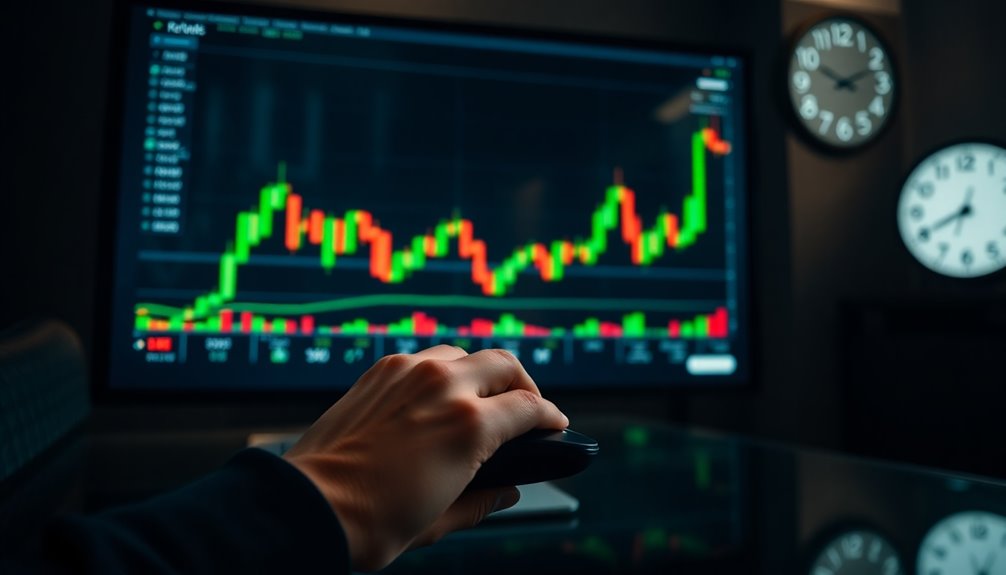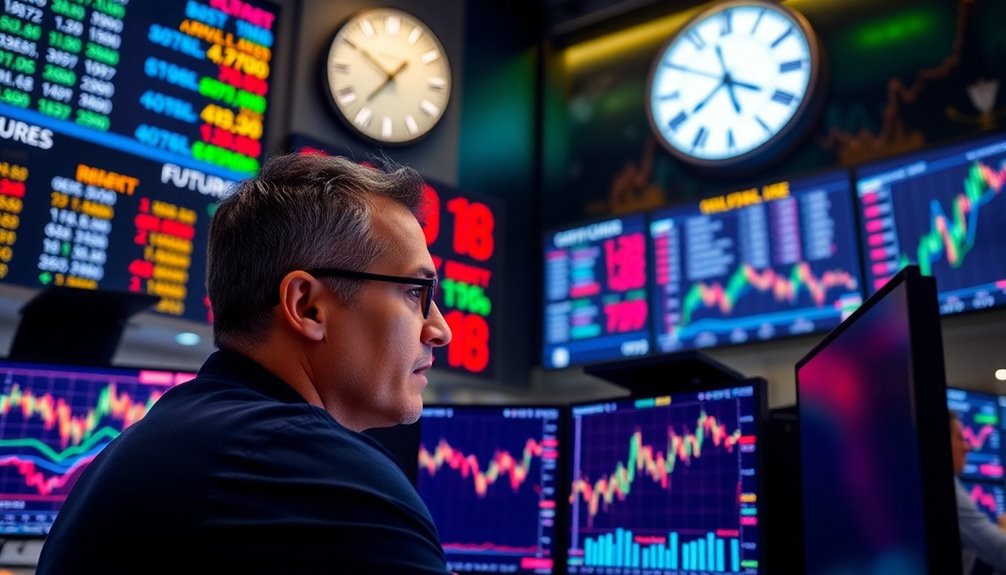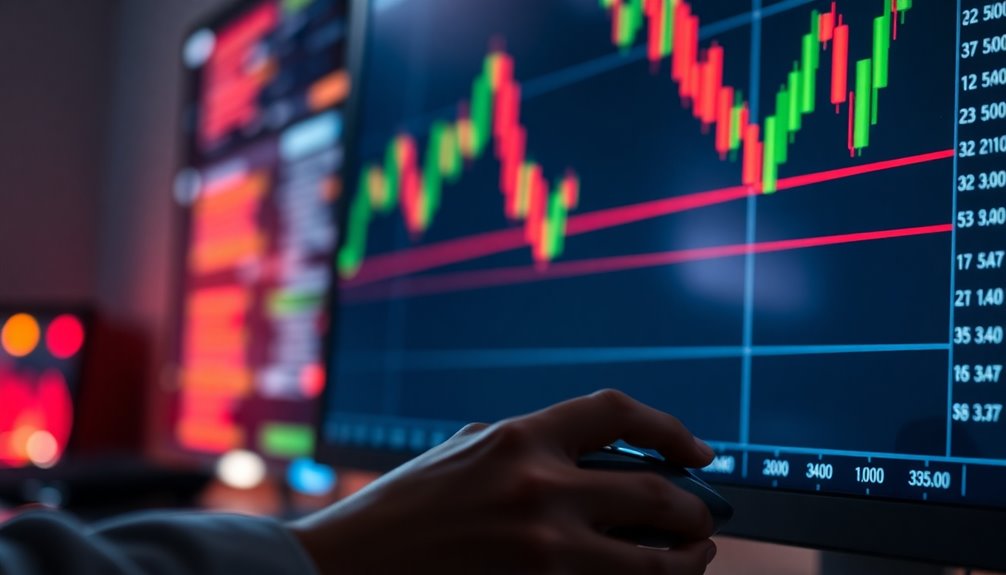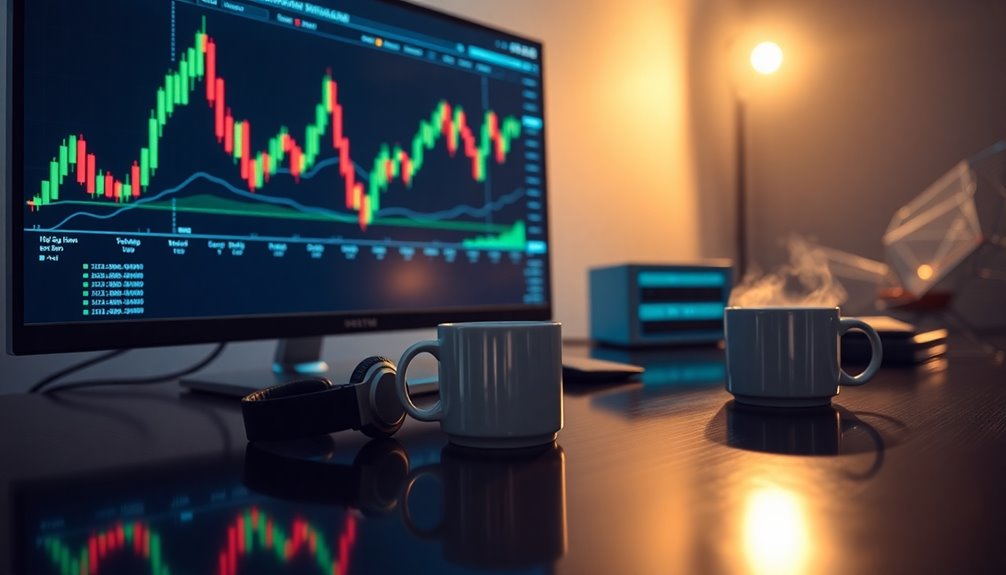Futures trading in crypto involves making agreements to buy or sell cryptocurrencies at a predetermined price on a set date in the future. This enables you to speculate on price movements without actually owning the assets. Major platforms like Binance and ByBit provide these contracts, allowing you to take advantage of leverage, which can increase both your potential gains and risks. It's crucial to manage your risks effectively, using tools like stop-loss orders. If you're curious about the mechanics and strategies related to futures trading, there's plenty more information waiting to be discovered.
Key Takeaways
- Futures trading in crypto involves agreements to buy or sell cryptocurrencies at a predetermined price on a future date.
- Major platforms like Binance and ByBit offer leveraged futures contracts on popular cryptocurrencies, enhancing potential profits and risks.
- Unlike spot trading, futures trading allows speculation on price movements without owning the underlying assets, providing flexibility in trading strategies.
- Effective risk management, including stop-loss orders, is essential in futures trading to limit potential losses and manage leverage effectively.
- The crypto futures market operates 24/7, reflecting high volatility and offering continuous trading opportunities for traders.
Futures Contracts Explained

When you delve into futures contracts, you'll find they're legally binding agreements to buy or sell standardized assets at a predetermined price on a specific date.
These contracts cover various underlying assets, like physical commodities or financial securities, and detail specifications such as quality and quantity.
Facilitated through a futures exchange, every contract maintains standardization, making it easy to transfer ownership. The exchange also minimizes counterparty risk by acting as an intermediary. Exchanges create and regulate futures contracts, ensuring that all participants are protected throughout the trading process.
With specific expiration dates, futures contracts can be settled via physical delivery or cash.
This regulated market ensures liquidity and anonymity, allowing traders to employ different strategies, whether for speculation or hedging against price fluctuations.
Understanding these basics sets the stage for successful futures trading.
Futures in Cryptocurrency Markets

As the cryptocurrency market continues to evolve, futures trading has emerged as a popular strategy for investors looking to capitalize on price movements. Major platforms like Binance, ByBit, and OKX offer diverse futures contracts, enabling you to leverage your positions significantly. Cryptocurrency futures contracts are traded on various exchanges, allowing exposure to cryptocurrencies without direct ownership.
While leverage can amplify profits, it also increases the risk of substantial losses, so it's crucial to tread carefully. You can choose between cash-settled and physically settled contracts, each with specific expiration dates.
The market's volatility means trading volumes can fluctuate dramatically, mirroring spot markets. Tools like technical analysis and trading bots can help you navigate these complexities, allowing you to implement effective strategies tailored to your investment goals.
Mechanism of Price Speculation

Understanding the mechanism of price speculation in futures trading is essential for navigating the complexities of the cryptocurrency market. Futures prices are derived from spot prices using a theoretical formula, factoring in the risk-free rate. However, real-world prices often deviate due to volatility and market perceptions. As a trader, you'll notice that prices can fluctuate wildly, influenced by market sentiment and the number of days until expiry. Additionally, futures contracts provide options for risk mitigation and hedging, allowing traders to protect their investments. By taking long or short positions based on your market predictions, you can potentially profit from price movements in either direction. To manage risk effectively, utilize tools like stop-loss orders, position sizing, and diversification. This strategic approach helps you stay aligned with market dynamics while making informed trading decisions.
Pros and Cons of Futures

Futures trading in cryptocurrency offers a mix of advantages and challenges that can significantly impact your trading experience.
On the pro side, leverage allows you to control larger positions with less capital, amplifying potential profits but also increasing risks. Trading on regulated exchanges ensures a secure environment, offering protections and high liquidity for smooth transactions. Futures also provide flexibility, enabling you to hedge against price movements and trade in both rising and falling markets. The crypto derivatives market provides diverse opportunities for traders to capitalize on market volatility.
However, the volatility of cryptocurrencies means your risks can multiply quickly. You'll need a solid understanding of derivatives and margin requirements. Additionally, managing expiration dates and settlement risks can complicate your trading strategy.
Balancing these factors is key to successful futures trading.
Futures vs. Spot Trading

When considering your trading options, it's important to weigh the differences between futures and spot trading.
Spot trading involves buying and selling cryptocurrencies for immediate delivery, giving you full ownership and control over your assets. This method is particularly suitable for long-term investment strategies as it requires no leverage.
In contrast, futures trading allows you to buy or sell contracts at a predetermined price for a future date without owning the actual asset. This means you can speculate on price movements and use leverage to control larger positions.
While spot trading is straightforward and less risky, futures trading offers the potential for profit in both rising and falling markets. Additionally, futures contracts enable both long and short positions, providing more flexibility in trading strategies.
Ultimately, your choice depends on your trading strategy and risk tolerance. Each method has its own advantages and considerations to keep in mind.
Volatility and Margin Calls

Volatility is a constant companion in the world of crypto futures trading, and it can significantly impact your trading strategies. The unpredictable price swings in crypto markets make it tough to forecast movements. Rapid fluctuations can change the value of your futures contracts quickly, sometimes leading to them trading at a premium or discount relative to spot prices. High volatility raises the risk of margin calls, forcing you to add funds or close positions to avoid liquidation. Understanding the concept of initial margin is crucial, as it represents the amount needed to open a futures position and can directly affect your trading decisions. It's crucial to monitor your account balance and understand leverage terms to manage these risks. Using volatility indicators like ATR and Bollinger Bands can help you anticipate price movements, ultimately aiding in your trading decisions.
Emerging DeFi Futures Platforms

Navigating the unpredictable landscape of crypto futures trading can lead traders to explore innovative solutions, such as emerging DeFi futures platforms.
These platforms operate on blockchain technology, ensuring transparency and security without a central authority. You'll find smart contracts automating trades, allowing for seamless transactions with various wallets.
Emerging DeFi platforms offer perpetual futures contracts, options for predicting price moves, and support for multiple cryptocurrencies. Additionally, the market for crypto futures is expected to grow significantly by 2025, attracting more traders and investment.
With high-leverage options and user-friendly interfaces, trading becomes more accessible. Additionally, governance tokens enable community involvement in decision-making, fostering a collaborative environment.
You'll appreciate the continuous updates based on user feedback and partnerships that enhance the trading experience, making these platforms a dynamic choice for futures trading in the crypto space.
Use Stop-Loss Orders Wisely

While engaging in crypto futures trading, using stop-loss orders wisely can significantly enhance your risk management strategy.
You have several options: a standard stop-loss triggers a sale at a set price but may not guarantee execution at that exact price. A guaranteed stop-loss ensures execution at your chosen price, offering added protection, though it might come with extra fees. Most brokers do not charge extra for stop-loss orders, making them a cost-efficient choice for traders.
Trailing stop-loss orders adjust automatically with market movements, helping you lock in profits while limiting losses.
To set up a stop-loss, select your asset, determine the quantity, and decide on a stop price that reflects your risk tolerance.
Frequently Asked Questions
How Do I Start Trading Crypto Futures?
To start trading crypto futures, you'll need to set up an account on a cryptocurrency exchange like Binance.
After signing up, complete the mandatory quiz and verify your account. Familiarize yourself with the platform's tools and interface.
Choose the type of futures contract you want, transfer assets to your futures account, and select your trading mode.
Finally, open a position and monitor it closely to manage risk effectively.
What Are the Tax Implications of Futures Trading?
When you dive into the world of futures trading, think of navigating a maze with tax implications lurking around every corner.
You'll face capital gains tax on profits once you close a position, whether through liquidation or otherwise.
If you're trading regulated futures, the 60/40 rule helps ease that tax burden, splitting gains into long and short-term.
Keep track of every trade, as accurate reporting's crucial to avoid surprises come tax season.
Can I Lose More Than My Initial Investment?
Yes, you can lose more than your initial investment when trading with leverage.
Since leverage allows you to control larger positions, even a small price movement against your position can lead to significant losses.
If the market moves unfavorably, you might face a margin call, forcing you to sell your assets at a loss.
It's crucial to manage your risks carefully and use strategies like stop-loss orders to protect your investment.
Are Futures Contracts Regulated Like Traditional Securities?
Like the intricate dance of a well-orchestrated symphony, futures contracts are regulated, but not like traditional securities.
You'll find the Commodity Futures Trading Commission (CFTC) overseeing these contracts, ensuring market integrity and preventing fraud.
Unlike the SEC's realm, the CFTC focuses on commodities, which includes certain cryptocurrencies.
What Platforms Offer the Best Crypto Futures Trading Experience?
When you're looking for the best crypto futures trading experience, platforms like Binance Futures and KuCoin stand out.
Binance offers a wide range of cryptocurrencies and demo accounts for practice, while KuCoin boasts over 300 futures contracts with competitive fees.
If you prefer high leverage, PrimeXBT might be your choice, and for user-friendly interfaces, consider Bybit.
Each platform has unique features tailored to enhance your trading journey.
Conclusion
In the world of crypto futures trading, you're stepping into a thrilling adventure that can lead to exciting opportunities. While it's essential to keep a close eye on the market and manage risks wisely, the potential rewards can be quite enticing. Just remember, like any exhilarating ride, it's best to fasten your seatbelt and enjoy the journey while being cautious. Embrace the possibilities, and with a little savvy, you might just find success in this dynamic landscape!









